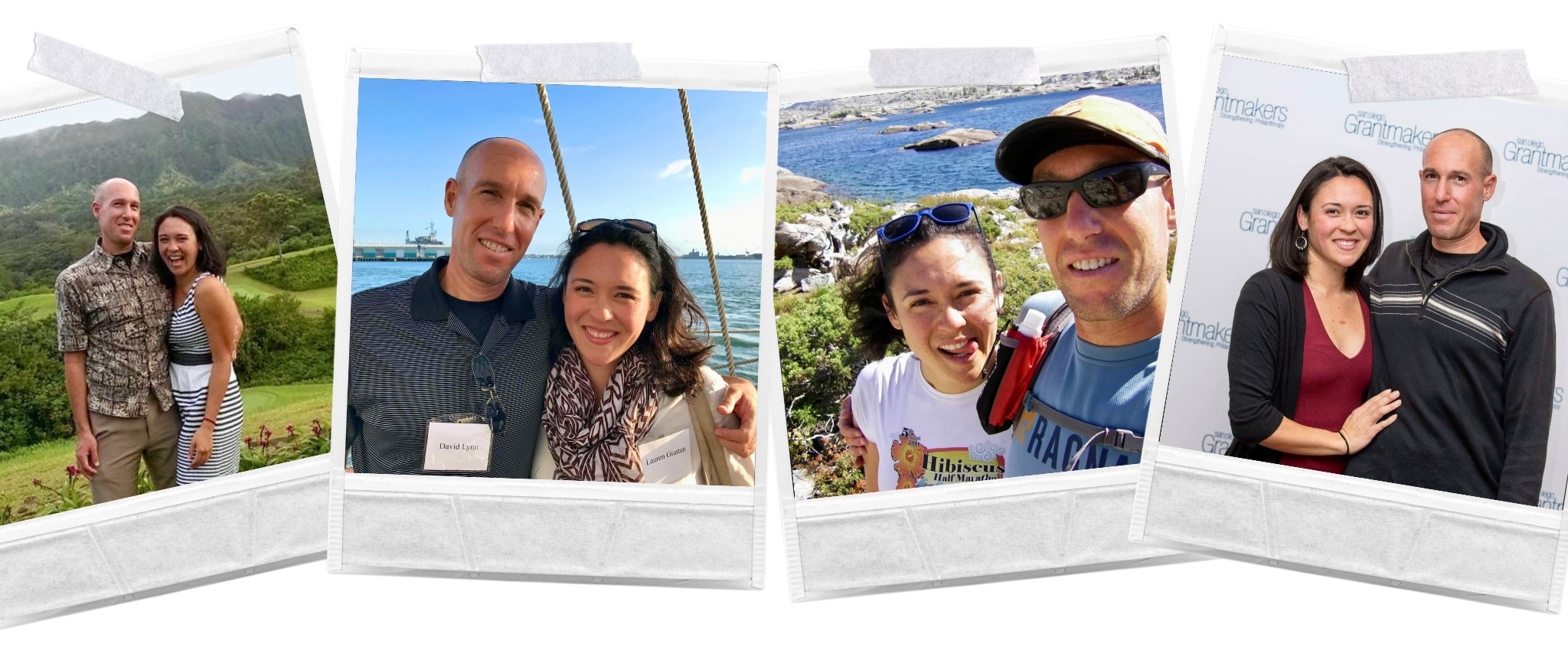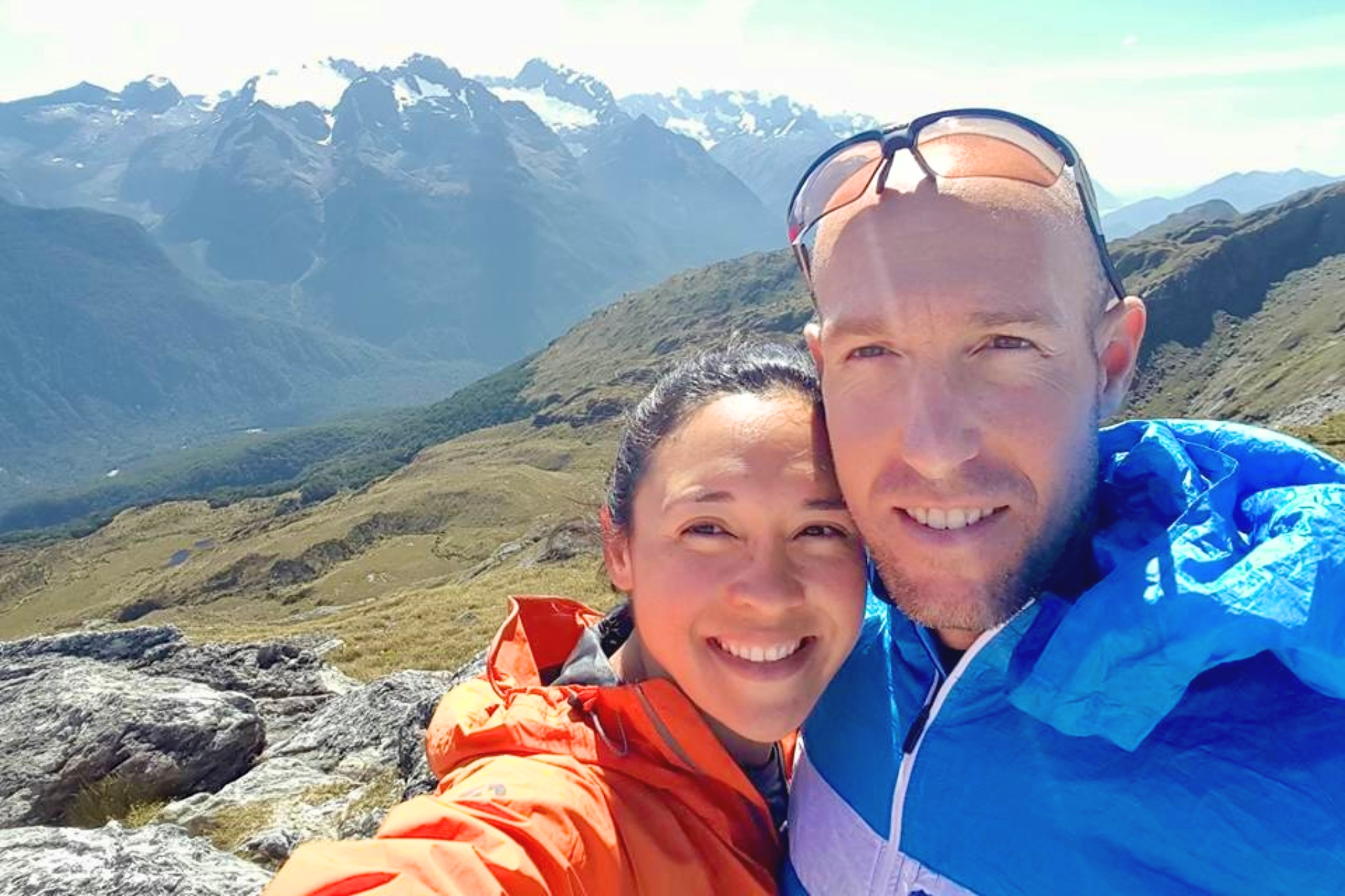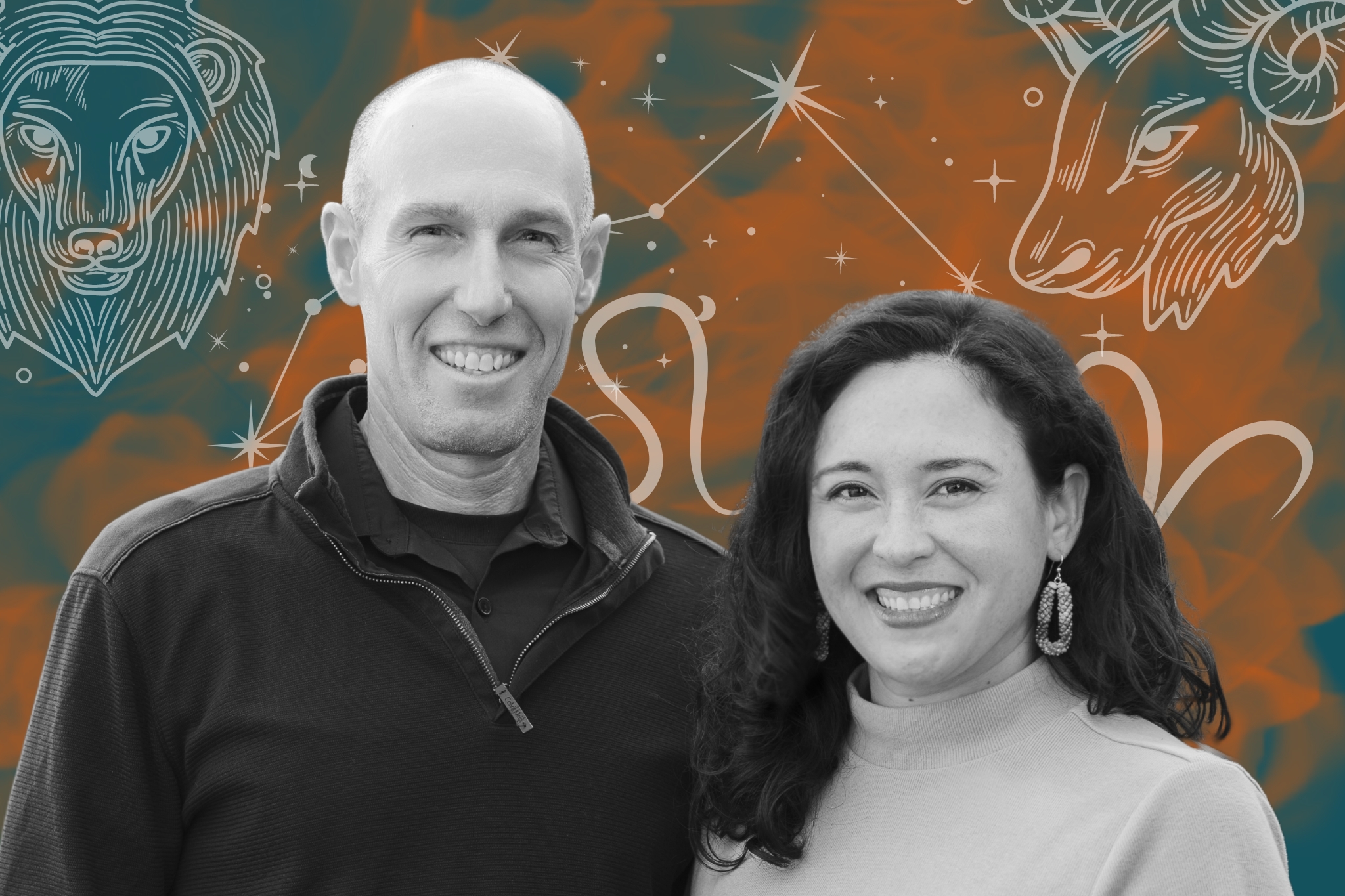Co-founders spend so much time problem-solving together that they are often described as being in a work marriage. Sometimes, co-founders may also be actual life partners.
Presented for the first time on the Mission Driven Finance blog, we learn how Lauren and David met and what makes them tick as business AND life partners in this “fire sign chat” (David’s and Lauren’s “Big Three” both include Leo and Aries).
This interview has been edited for clarity and brevity.
How did you meet?
Lauren Grattan (LKG): My good friend Efrem Bycer used to organize a monthly social purpose book club for Young Nonprofit Professionals Network San Diego (YNPN) and I was the incoming board chair of YNPN in 2012. David came to the one about social impact bonds that we co-hosted with San Diego Grantmakers, now Catalyst of San Diego and Imperial Counties.
David Lynn (DL): I was too old for YNPN, but there were good people and once in a while there was a topic I was interested in. I happened to know something about social impact bonds because I’m a nerd. At the time I was the board treasurer of San Diego Grantmakers, now Catalyst. I was also co-founder and chair of Mission Edge, a nonprofit that spun out of San Diego Social Venture Partners supporting other nonprofits with back office essentials like accounting, HR, and finance. Jaci, who was running Hands On San Diego, was the chair of YNPN and exploring fiscal sponsorship options.
Jaci asked Lauren to talk to me about fiscal sponsorship, so we met for tea. And then I made excuses to talk to Lauren about more stuff.
So you started out in a professional capacity, then moved to a personal relationship. What drew you to each other aside from fiscal sponsorships?
LKG: Brains are cool to me and David has a great one. I dig how he thinks about systems—embodying some of what adrienne maree brown calls fractal energy before I had a phrase for it—recognizing repeating patterns connecting the big picture and small details.
DL: Lauren was willing to put up with my dogs (and me).
We’re trying to make a better world. That shared vision and commitment help us get through friction points.

As professional partners, what were you looking to solve together?
LKG: While we met to talk about fiscal sponsorship, we also talked about systems change and what’s needed to support a vibrant social sector and make a difference. We saw a lot of the same structural challenges: not the right incentives in place or the right financing for infrastructure and talent—especially in our hometown of San Diego.
We were always aligned philosophically about the world we wanted to see. I was frankly a bit frustrated with my life in nonprofits and philanthropy. It didn’t feel like it was doing enough to affect things in a world that is literally on fire—and mostly on fire for low-income communities and communities of color.
DL: We had been together for three or four years before starting Mission Driven Finance. And while both of us were becoming increasingly frustrated and seeing the opportunities to do better, multiple things were coming together at the same time. I was working at a family office and with some philanthropic institutions that were looking for ways to invest—not just make grants—in San Diego, and if they called their broker at Morgan Stanley and asked, “Do you have investment products in San Diego that support women or education or otherwise,” they were typically told no.
We had partners at places like CDC Small Business Finance (now part of Momentus Capital) and Union Bank (now part of U.S. Bank) and others committed to serving small businesses and nonprofits that wanted to work together to find new ways to support them with impact investing.
So we said, “Well, let’s see if we can find a way to lend to those small businesses and nonprofits.”
We didn’t set out to build a big business. Initially, we thought this might be a side nonprofit thing. We started to realize that 1) it was going to take some significant infrastructure to do it well; and 2) it was a big opportunity, not just in San Diego, but nationally, which is when I asked Lauren, “Can we mortgage the house and go do this?” To do it was going to take significant time, capital, and emotional investment.
LKG: One of the things that we were working on at the time was the San Diego Impact Investors Network and ecosystem building. That’s my sweet spot as a chief community officer—a people person, all about narrative and programming, figuring out how we put the pieces together so that folks get the information and inspiration that they need to be able to—as I put it crassly—get off their ass and do something. I was ready to leave my last role and David said, “What do you think about doing this full-time? Expanding what we’ve been doing with San Diego Impact Investors Network and putting together not just educational programming, but opportunities to learn by doing and move money. Let’s do that for real!”
DL: When we originally launched, we started with a lending business that I was running and a nonprofit education and technical assistance provider that Lauren was running. We formed both of those entities and then realized that bifurcation was going to create more headache than value. That’s when we knew mobilizing money for social purpose could be a real business.
How do your backgrounds inform your leadership styles and your roles within Mission Driven Finance?
LKG: I have to name that as a mixed-race woman of color, I know that I benefit from colorism. But particularly as a mixed-race woman of color in finance, I don’t want people to think that I wasn’t a professional in my own right and that my partner just gave me a job out of pity.
DL: We are very much aligned co-founders, but to an external world, I’m the CEO, and Lauren’s the chief community officer (CCO). That’s based on our skillsets and orientation. But it’s not because the CEO is more powerful than the CCO or anything in our case. Lauren is more of a badass than me. I’m just a nerd.
LKG: People see “CEO” and think, David must be the decision maker. David’s been awesome as an ally and co-leader. Whenever he is approached to be a speaker, he is good at asking, “Is my voice the one you need to hear?” Let’s do away with “manels;” we don’t need more “pale, male, and stale” talking about finance.
Now, we have a majority women leadership team. As soon as we hired our first person—a woman—we were a majority-women team. Never looked back.
It’s also why we’ve been very intentionally developing our executive and leadership teams so that it’s not the “Lauren and David Show.” It is the “Mission Driven Finance Show.”
How do you want your personal dynamics with each other to intentionally influence team culture?
DL: It’s not work-life balance, it’s work-life integration—having the flexibility to bring your whole self to work and not feel like you have to be guarded. We want people to be open and transparent with each other. Especially in a remote environment team, social capital is so critical. If I don’t know anything about you, our ability to interact about the work is going to be limited and stunted.
If we’re modeling that with each other and with the rest of the team, then hopefully that permeates and people are happier and more comfortable interacting in all sorts of different ways within the team.
LKG: One of the things that’s important to us in growing Mission Driven Finance is a full expression of the diversity of lived, learned, and labored experiences. This is not a thing you typically see in finance. My lived experience is vastly different from David’s. While we overlap, we come with very different strengths and we come with very different approaches and very different ways of living and communicating in the world. I hope we model that there’s not one right way to show up.

What do you see as each other’s strengths?
LKG: Someone recently shared with me that they appreciate us naming our values on our website, and that humor is one of them. That is definitely one we share. David is wholeheartedly committed to humor and bringing lightness into work that can be dark and dismal. You’ve got an unmatched cache of dad jokes. It is so helpful for mental health reasons to have humor at work.
Beyond that, this dude can see opportunities to put together innovative financial structures that align a variety of different partners in ways that nobody is expecting…like, “What if we were to use this new market tax credit allocation and use that as subordinate capital and then we could leverage this and that and get that to unlock these other things?”
David sees possibility where other people just see red tape.
DL: While I love those puzzles and the patterns, I don’t always communicate so wonderfully. Whether it’s a financial puzzle or a team and cultural thing, Lauren is the better one to implement it with the team. Or with the community and communicate it.
Lauren brings the impact perspective much stronger than me. And she brings that warmth and community connection stronger than I can.
We are very much aligned co-founders, but to an external world, I’m the CEO, and Lauren’s the chief community officer (CCO). That’s based on our skillsets and orientation. But it’s not because the CEO is more powerful than the CCO or anything in our case. Lauren is more of a badass than me. I’m just a nerd.
How do you work through conflict and disagreement?
DL: For the most part, I think we’ve done well and have limited fights and disagreements with each other. Part of it is that we’ve been well aligned on our principles, our goals, where we’re going, and what we’re doing, so we don’t have disagreements about the underlying philosophy of what we’re doing at Mission Driven Finance. We might disagree with some tactics or other sorts of things.
We do better fighting the common enemy than fighting each other.
LKG: A lot of dog walks turn into conversations about how we are working through conflicts. We don’t let things fester. We want to get to, “What’s your motivation and why do you think that’s the right answer? Let me add some counterpoint and more information to that.”
We’re trying to make a better world. That shared vision and commitment help us get through friction points.
What advice would you give to other co-founders considering going into business together while maintaining a personal relationship?
LKG: The most important thing for me is establishing boundaries because it can be easy to just be all work all the time, especially with a growing business. Anybody who’s building a business knows it can be all-consuming. When you’re spending all of your off time asking, “How was your day?” but you just talk about work, then your dinner conversation is bleeding into HR problem-solving and “How are we going to address this?” It can burn you out. So I very clearly said, here’s the box for Mission Driven Finance. It’s a big box, but it’s not gonna be the only thing that we ever talk about.
While it’s great that David is my life partner, I don’t think that’s necessary for founding teams. Having mutual respect and shared vision is critical, but that’s part and parcel of how we came to be together.
DL: This would be true for any deep co-founder relationship because a deep co-founder relationship is basically a work marriage. We might spend 15 minutes after dinner talking about a work thing and can make a decision that we can implement the next day. So the speed of iteration can be a value. We have a lot more time to work through things together.
LKG: I co-led YNPN with Jessica Kort—I was chair and she was vice chair. We had mutual respect for each other. She’s one of my best friends. We have a shared vision but also very different skill sets. She and I would occasionally do a walk and talk and be able to get up to speed and alignment. Time together is important for co-founders or co-leaders.
There are some downsides to having a combo business+life partner; it’s hard to take a real vacation and both be unplugged. And we know that there are key person risks. I’m not not getting on an airplane with David—there’s a risk to the business if it falls out of the sky and we’re both in it—though we are always working on disaster and succession planning.
It’s also why we’ve been very intentionally developing our executive and leadership teams so that it’s not the “Lauren and David Show.” It is the “Mission Driven Finance Show.”
DL: We didn’t even want to do an “about the founders” Q&A because we don’t think it’s about us.
As a leader, as a CEO, if things are going great, the team gets the credit. If things are going bad, it’s my fault. That’s just the orientation we have to take. For us in a personal relationship as co-leaders and as a company, we can’t bring a lot of ego into it, even if we do have to bring a lot of stubborn confidence and optimism and belief that we can pull it off.
Service above self.


